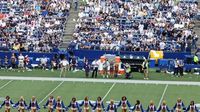For years, the dazzling Dallas Cowboys Cheerleaders (DCC) dazzled on the field while quietly grappling with a harsh financial reality: their pay was shockingly low for such a high-profile role. But that narrative has dramatically shifted, thanks to a combination of determined advocacy, strategic negotiation, and a global audience watching their journey unfold on Netflix.
The Netflix docuseries America’s Sweethearts: Dallas Cowboys Cheerleaders Season 2, which began streaming last week, has put a spotlight on the cheerleaders’ pay struggles and their fight for fair compensation. The show follows a group of veteran cheerleaders, including Jada McLean, Armani Latimer, Amanda Howard, and Megan McElaney, as they confront the Cowboys organization to negotiate better contracts. What started as quiet discontent escalated into a bold push for change, including talks of a walkout that ultimately didn’t materialize but underscored the seriousness of their demands.
Before this shift, the cheerleaders were earning approximately $15 an hour for practices and $500 per game appearance, figures that hardly reflected the physical demands, skill, and spotlight of their role. Many squad members juggled multiple full-time jobs outside of cheerleading just to make ends meet, despite being part of one of the most recognizable cheer teams in the world.
The season’s climax revealed a game-changing victory: a 400% pay raise for the upcoming NFL season. Veteran cheerleader Megan McElaney described the raise as "life-changing," explaining that some veterans will now earn upwards of $75 an hour, with game appearances paying even more than that. This is not just a simple raise; the entire pay structure was overhauled to include differentiated rates for rehearsals, games, and special appearances, reflecting the varied demands of their roles.
Jada McLean, a five-year veteran who retired after the 2024 season, shared her emotional reaction to the news during a video call on June 23, 2025. "I ended up crying in that meeting," she said. "It felt like there’d been so much that went into trying to see this change happen, and to finally know that it was all worth it in the end. It was a really moving moment for me, for the other leaders and the team. I’m just grateful they heard us out because there were moments when we didn’t think they were hearing us." McLean also emphasized that the show's visibility played a crucial role in accelerating the pay raise. "I think there would have been an increase, but I don’t think it would have been nearly this big," she noted.
The Netflix series has been a global sensation, ranking in the top 10 programs worldwide with over 3.3 million views in its first week. Greg Whiteley, the Emmy-winning documentarian behind the show, acknowledged the series may have influenced the timing of the pay raise, though he humbly credits the cheerleaders and the Cowboys organization for making it happen. "We show up as agnostics," Whiteley explained. "We are not here to tell the Cowboys how they should run their organization. We’re not here to tell the cheerleaders how much they should be paid. We are there just to film. I have a high degree of faith that if we stay obedient to those principles, something true emerges. And I believe that speeds up the arc of justice or whatever."
The negotiation process was not without its challenges. Early on, talks of a walkout surfaced, signaling the squad’s willingness to stand firm. The cheerleaders’ leadership, including McLean, McElaney, and Latimer, navigated complex conversations with management, sometimes sharing difficult truths about their financial struggles and the emotional toll of underpayment. Kelli Finglass, the longtime director of the DCC, and Judy Trammell, the head choreographer, expressed pride in the team’s resilience and the outcome. "At first, it was a little uncomfortable because we weren’t part of the initial discussions," Finglass said, with Trammell nodding in agreement. "But we’re thrilled, as coaches, that the cheerleaders are very happy with the resolution, and I think the value of their talent and their dedication is something that they will always be proud of."
Despite the substantial pay raise, some challenges remain. The cheerleaders still do not receive health insurance from the team, a significant concern given the physically demanding nature of their work. Former members like Caroline Sundvold have openly discussed long-term injuries sustained during performances, highlighting the need for better medical support. Nevertheless, the new pay structure marks a significant step forward, offering veterans an estimated annual income between $120,000 and $150,000, with additional earnings possible through appearances and social media engagements.
The raise also reflects a broader reckoning in the entertainment and sports industries regarding fair compensation for performers and creatives. The Dallas Cowboys Cheerleaders’ success may inspire similar teams, including NBA dancers, college cheer squads, and performing arts groups, to advocate for better pay and working conditions.
McLean, who initially hesitated to appear in Season 1 of the Netflix series out of concern for how her story would be portrayed, embraced the opportunity in Season 2 after witnessing the production’s integrity. She hopes their story encourages others, especially women, to use their voices in the workplace. "My mom always told me, ‘Never be afraid to use your voice. Because the worst they’re going to say is ‘No,’’" McLean said. "I would encourage people to use their voices. I feel like women, especially, feel like we have to be quiet and we have to accept things, and that’s not the case."
McLean also reflected on her role as the point of the triangle, a leadership position on the squad, which surprised her given her height, a trait some perceived as a disadvantage. "It’s an honor," she said. "The fact that they trusted you, they trust that if something were to happen, they know you can lead the team. So, to know that they had that kind of trust in me, I’m so grateful for that."
The Dallas Cowboys Cheerleaders’ journey from underpaid performers to well-compensated professionals is a story of perseverance, unity, and the power of visibility. It underscores the importance of fair pay in roles often glamorized but undervalued and offers a blueprint for others seeking justice in their workplaces. As the upcoming NFL season approaches, these cheerleaders will take the field not only with renewed financial security but with the satisfaction of having changed the game for themselves and future generations.





